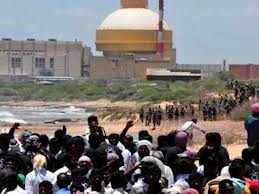
Kudankulam, September 10: Police today fired teargas shells to disperse anti-nuclear protesters, who again tried to lay seige to the nuclear power plant here demanding a halt to the loading of enriched uranium in the reactor.
Defying prohibitory orders, the protesters refused to disperse from the sea shores, 500 metres away from the Kudankulam Nulcear Power project, despite repeated pleas by top police and district officials.
As the standoff continued this morning, police brought in additional reinforcements while some protesters attempted to take the sea route to breach the tight security and reach the plant site, police said.
As tension ran high, police lobbed teargas and chased away the protesters, some of whom ran into the sea and shouted slogans against the police action.
Since yesterday, more than 1,000 anti-nuclear protesters led by the People's Movement Against Nuclear Energy convener S P Udayakumar have been staying put at the seashore close to the plant demanding Chief Minister Jayalalithaa's intervention to stop loading of fuel in the first reactor.
The area has come under a tight security blanket with over 2,000 police personnel, including 400 RAF, deployed on duty.
Prohibitory orders are in place in a seven km radius from the plant in view of the siege call given by PMANE, seen as a last ditch attempt to prevent commissioning of the plant.
Regulatory authorities had recently given the go-ahead for loading the enriched uranium in the plant, whose commissioning was also given the nod by the the Madras High Court.
The first unit of KNPP, an Indo-Russian joint venture, was scheduled for commissioning in December last, but was bogged down by delay due to protests against the project.




Comments
Add new comment